| Srl | Item |
| 1 |
ID:
175523
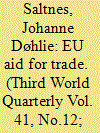

|
|
|
|
|
| Summary/Abstract |
Does the EU’s Aid for Trade (AfT) initiative contribute to global justice? Complementing work that considers distributive justice, in this paper we adopt the central tenets of the republican theory of non-domination as a regulative ideal for justice in international relations. We evaluate the extent to which the EU’s AfT initiative results from reduced political domination in international trade negotiations, and if that then mitigates economic dependency between European and African states. We first provide a qualitative account of the processes that led to the establishment and subsequent development of AfT. We then consider the extent to which the AfT has promoted the reliance of African states on European foreign direct investment (FDI) relative to FDI from other regions (including and especially from within Africa itself) using subnational, project-level, data. Our findings suggest that EU AfT does not reinforce dominating forms of dependency in the international arena, at least when measured by the source of the FDI that it attracts, while AfT is itself an outcome of somewhat less dominating power relations in trade negotiations between wealthier and poorer states.
|
|
|
|
|
|
|
|
|
|
|
|
|
|
|
|
| 2 |
ID:
158917


|
|
|
|
|
| Summary/Abstract |
The level of, and trends in, global inequality and global poverty are indicative assessments of who has benefited from economic growth. The revision of price data has led to a reassessment of those estimates. Through an extensive overview of the implications, we argue that the data can be read in different ways. Official estimates show global extreme poverty and global inequality are considerably lower than previously thought. We argue that these changes are much less significant than they at first appear, and we present a more nuanced alternative interpretation by exploring changes across the entire global distribution.
|
|
|
|
|
|
|
|
|
|
|
|
|
|
|
|
| 3 |
ID:
144256
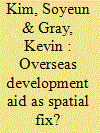

|
|
|
|
|
| Summary/Abstract |
This paper examines the extent to which South Korea’s developmental aid programme to Africa can be understood as a form of ‘aid as imperialism’. We argue against the depiction of a crude determinism between the ‘interests of capital’ and the international activism of the South Korean state through aid provision. Drawing on Harvey’s theory of the new imperialism, we argue that, while the structural transformations in the South Korean political economy explain Seoul’s ODA programme at a general level, it is strongly influenced by geopolitical objectives which often undermine South Korea’s ability to pursue distinctly mercantile aims.
|
|
|
|
|
|
|
|
|
|
|
|
|
|
|
|
| 4 |
ID:
140970
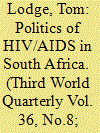

|
|
|
|
|
| Summary/Abstract |
A decade ago it seemed likely that African governments would be destabilised by the impact of the HIV/AIDS epidemic. This article tests some of the presumptions in such forecasting with an examination of the South African case. It begins with an assessment of the effects on the public health system of the South African government’s efforts to cope with the illness. Efforts to implement universal treatment of people who are HIV-positive appear to have strengthened government, while the costs have been affordable. The efforts have extended the embrace of the public health system and prompted the engagement of civil society in policy formation and implementation. Survey evidence suggests that the government has gained public approval and that its health service delivery has become more socially accountable. Civil protest to engender political reforms in the treatment of AIDS patients has enhanced the role of constitutional checks on executive authority.
|
|
|
|
|
|
|
|
|
|
|
|
|
|
|
|
| 5 |
ID:
169119
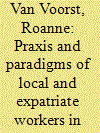

|
|
|
|
|
| Summary/Abstract |
This paper discusses practices and paradigms that expatriate and national humanitarian aid workers use to deal with major problems they encounter in their daily work. It views ‘Aidland’ as an arena where different actors encounter, negotiate and shape the outcome of aid. One of the main findings is that there are consistent differences in the way expatriate and national aid actors perceive problems in their field, as well as in the way they respond to these issues. The paper shows that these perceptions often translate into heterogeneous paradigms and practices between expatriate and national staff, particularly around remote control aid, partnerships and donor reporting. These findings are highly relevant in the current context of ‘localisation’, suggesting that the so-called North/South divide continues to exist and more explicit attention should be given in aid research to the heterogeneous strategies of different actors working in the aid sector. The paper is based on analysis of data derived from a multiple-round Delphi expert panel study involving 30 highly experienced humanitarian aid practitioners.
|
|
|
|
|
|
|
|
|
|
|
|
|
|
|
|
| 6 |
ID:
143579
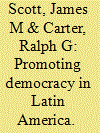

|
|
|
|
|
| Summary/Abstract |
Since the Cold War the USA has articulated and implemented explicit strategies of democracy promotion. One interesting target of such efforts is Latin America, in part because of the region’s geographic proximity to the USA and of the mixed record of US support for democracy there. This paper examines the impact of the end of the Cold War and the 9/11 episode on the nature, purposes, targets and consequences of US democracy assistance to Latin America. Examining democracy aid allocations, social and political factors and other variables, it traces changes in aid strategies, purposes and recipients generated by these paradigm shifts, and assesses the impact of such assistance on the politics of the region. It concludes with implications of these findings for US democracy promotion policies.
|
|
|
|
|
|
|
|
|
|
|
|
|
|
|
|